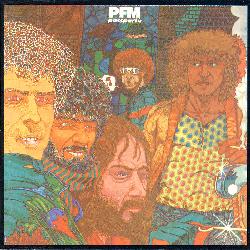 As noted
previously, the most famous Italian progressive rock group was Premiata
Forneria Marconi, named after a disused baked goods plant where the band
would practice when they weren’t doing session work for ‘top-flight’
acts. All of the fine records subsequently brought out by PFM can never
establish the superiority of this band, however, over the many other Itaprog
acts who, failing to make much impact on contemporaries, were content
to leave notice to posterity. But that is no excuse for allowing one of
the great albums by PFM to fall into neglect, which is precisely the fate
that has befallen their Passpartù of 1978. Supposedly this
record represents a capitulation to the failing popularity of the progressive
genre and thus an effort to move into mainstream pop. The pundits want
you to believe this, yet Passpartù captures that fateful
moment in Itaprog’s history with detachment and consummate artistry.
In the first two tracks, especially, PFM actually explores a folk-music
idiom. The mood or sensibility is established in this manner, and in the
third track conditions for progressive development are set out fairly
explicitly. By the fourth, “Le Trame Blu,”.... But that is the
end of Side 1, and who knows whether these records were designed as a
whole or as an amalgam of two distinct sides? Prog may have ended as a
movement in the preceding year, but here its spirit is alive and well.
As noted
previously, the most famous Italian progressive rock group was Premiata
Forneria Marconi, named after a disused baked goods plant where the band
would practice when they weren’t doing session work for ‘top-flight’
acts. All of the fine records subsequently brought out by PFM can never
establish the superiority of this band, however, over the many other Itaprog
acts who, failing to make much impact on contemporaries, were content
to leave notice to posterity. But that is no excuse for allowing one of
the great albums by PFM to fall into neglect, which is precisely the fate
that has befallen their Passpartù of 1978. Supposedly this
record represents a capitulation to the failing popularity of the progressive
genre and thus an effort to move into mainstream pop. The pundits want
you to believe this, yet Passpartù captures that fateful
moment in Itaprog’s history with detachment and consummate artistry.
In the first two tracks, especially, PFM actually explores a folk-music
idiom. The mood or sensibility is established in this manner, and in the
third track conditions for progressive development are set out fairly
explicitly. By the fourth, “Le Trame Blu,”.... But that is the
end of Side 1, and who knows whether these records were designed as a
whole or as an amalgam of two distinct sides? Prog may have ended as a
movement in the preceding year, but here its spirit is alive and well.
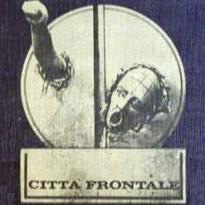 The Itaprog
Parnassus undoubtedly has a place reserved for the Neopolitan band Osanna,
but here we run into problems. Since the music of Osanna is pretty rough-and-ready,
no single item amongst their five-album corpus emerges as their ‘classic’,
and at least one or two of the discs perhaps do not stand up altogether
favorably against the many contemporaries. Furthermore, there were offshoots
– we have already met Cervello, which was not altogether an offshoot,
but very closely related with Osanna. And among these related bands Città
Frontale is neglected and even disparaged, yet they happen to be the offshoot
that appeals to me the most. Interestingly, Città Frontale is the
name that Osanna used before they started recording and while they still
counted Balletto di Bronzo’s Gianni Leone among them. After the break-up
of Osanna in 1974, a couple of the guys formed a new Città Frontale,
and they put out an album the following year called El Tor. This
is a festive album – but also subdued, as though by strong sunlight.
The common accusation is that it lacks Osanna’s fire and intensity.
Yet generally it is a more disciplined music, and never trite, but solid,
even stolid, and solicitous underneath for the listener’s interest.
The Itaprog
Parnassus undoubtedly has a place reserved for the Neopolitan band Osanna,
but here we run into problems. Since the music of Osanna is pretty rough-and-ready,
no single item amongst their five-album corpus emerges as their ‘classic’,
and at least one or two of the discs perhaps do not stand up altogether
favorably against the many contemporaries. Furthermore, there were offshoots
– we have already met Cervello, which was not altogether an offshoot,
but very closely related with Osanna. And among these related bands Città
Frontale is neglected and even disparaged, yet they happen to be the offshoot
that appeals to me the most. Interestingly, Città Frontale is the
name that Osanna used before they started recording and while they still
counted Balletto di Bronzo’s Gianni Leone among them. After the break-up
of Osanna in 1974, a couple of the guys formed a new Città Frontale,
and they put out an album the following year called El Tor. This
is a festive album – but also subdued, as though by strong sunlight.
The common accusation is that it lacks Osanna’s fire and intensity.
Yet generally it is a more disciplined music, and never trite, but solid,
even stolid, and solicitous underneath for the listener’s interest.
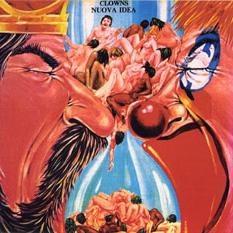 Clowns,
which came out in 1973, is apparently the most cerebral and, by inference,
most progressive of the three LPs by Nuova Idea. From what I’ve heard
of the other albums, overall this band fits nicely into the progressive
mould in terms of what it was trying to achieve. Apparently by 1971, when
they signed their record contract, there really was a “new idea”
for music that rocked, and they were having something to say about it,
and would continue doing so! But this was equally the search for a new
idea – miraculously enough – and I guess by the time of Clowns
they had basically found it, that is, something that clearly would not
sell for a success, but would remain a testament to the age. The exaggerated
cynicism of Ricky Belloni’s occasional vocals fits in with this conception,
especially when considered against the refined and elaborate compositions,
rendered with arrangements so careful and balanced as to lend a subdued
atmosphere to what is really a pretty wild musical outing. It would be
a mistake not to regard this as a classic – certainly it is rock,
progressive, and engrossing. As to the front cover, I wouldn’t worry
about it too much. That’s a king and a clown, and yes, there is an
orgy transpiring on their noses and between their brows, but slipping
down and spreading beyond, without ever changing much.
Clowns,
which came out in 1973, is apparently the most cerebral and, by inference,
most progressive of the three LPs by Nuova Idea. From what I’ve heard
of the other albums, overall this band fits nicely into the progressive
mould in terms of what it was trying to achieve. Apparently by 1971, when
they signed their record contract, there really was a “new idea”
for music that rocked, and they were having something to say about it,
and would continue doing so! But this was equally the search for a new
idea – miraculously enough – and I guess by the time of Clowns
they had basically found it, that is, something that clearly would not
sell for a success, but would remain a testament to the age. The exaggerated
cynicism of Ricky Belloni’s occasional vocals fits in with this conception,
especially when considered against the refined and elaborate compositions,
rendered with arrangements so careful and balanced as to lend a subdued
atmosphere to what is really a pretty wild musical outing. It would be
a mistake not to regard this as a classic – certainly it is rock,
progressive, and engrossing. As to the front cover, I wouldn’t worry
about it too much. That’s a king and a clown, and yes, there is an
orgy transpiring on their noses and between their brows, but slipping
down and spreading beyond, without ever changing much.
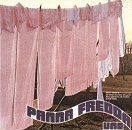 Where do
we place the origin of Italian progressive rock music? We cannot go as
far back as 1970. Even the most advanced and esoteric rock sounds from
that year are clearly psychedelic, not genuinely progressive. A number
of possibilities exists from 1971, among which Caronte by The Trip,
Terra In Bocca by I Giganti, Collage by Le Orme, L’uomo
by Osanna, and Concerto Grosso by the New Trolls. Yet arguments
can be made against each of them. The origins must still be sought in
this year, before PFM brought out their Storia Di Un Minuto early
the next year. So perhaps the credit should go to Panna Fredda and their
Uno album. Admittedly the idiom remains primitive, but there are
suggestions that the display of excellence in musicianship had now become
one of the primary goals. Moreover, the tracks constitute a progression
as though movements of a larger musical whole, a music constructed in
relation to itself. This then is a neglected but vital contribution to
the Italian progressive movement standing roughly at the beginning.
Where do
we place the origin of Italian progressive rock music? We cannot go as
far back as 1970. Even the most advanced and esoteric rock sounds from
that year are clearly psychedelic, not genuinely progressive. A number
of possibilities exists from 1971, among which Caronte by The Trip,
Terra In Bocca by I Giganti, Collage by Le Orme, L’uomo
by Osanna, and Concerto Grosso by the New Trolls. Yet arguments
can be made against each of them. The origins must still be sought in
this year, before PFM brought out their Storia Di Un Minuto early
the next year. So perhaps the credit should go to Panna Fredda and their
Uno album. Admittedly the idiom remains primitive, but there are
suggestions that the display of excellence in musicianship had now become
one of the primary goals. Moreover, the tracks constitute a progression
as though movements of a larger musical whole, a music constructed in
relation to itself. This then is a neglected but vital contribution to
the Italian progressive movement standing roughly at the beginning.
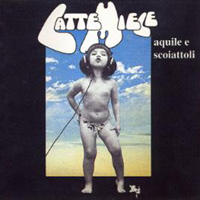 I have nothing
in principle against Latte E Miele, but I hate to have to choose horses.
Ask me to assign classic status to one or the other of their Polydor records
– one is regularly challenged to do this given the icon status of
their Passio Secundum Mattheum (1972) – and I get into a serious
problem of justification. Focus on one of them, and it is just too easy
to poke holes in the argument. And didn’t this band then go and lose
its recording contract with Polydor, so that when it reappeared only one
of the original members – the drummer, who was not one of the composers
– was still present? Then if we turn to their Aquile e Scoiattoli,
from 1976 on the progressive Magma label, there is the baffling circumstance
that the music, high-grade progrock throughout, usually sounds like no
one other than Latte E Miele, even when the addition of guitar transforms
the instrumentation. Apparently, records like the first ones by Latte
E Miele helped to establish a genre, but if an Itaprog genre does exist,
Aquile e Scoiattoli is an attractive and representative example
of it. Well, I have to admit that sounds slightly stupid, especially given
the lateness of the day, 1976, the evening of the genre. Sure, Aquile
e Scoiattoli is an addendum of sorts, and maybe that’s part of
what makes it a classic.
I have nothing
in principle against Latte E Miele, but I hate to have to choose horses.
Ask me to assign classic status to one or the other of their Polydor records
– one is regularly challenged to do this given the icon status of
their Passio Secundum Mattheum (1972) – and I get into a serious
problem of justification. Focus on one of them, and it is just too easy
to poke holes in the argument. And didn’t this band then go and lose
its recording contract with Polydor, so that when it reappeared only one
of the original members – the drummer, who was not one of the composers
– was still present? Then if we turn to their Aquile e Scoiattoli,
from 1976 on the progressive Magma label, there is the baffling circumstance
that the music, high-grade progrock throughout, usually sounds like no
one other than Latte E Miele, even when the addition of guitar transforms
the instrumentation. Apparently, records like the first ones by Latte
E Miele helped to establish a genre, but if an Itaprog genre does exist,
Aquile e Scoiattoli is an attractive and representative example
of it. Well, I have to admit that sounds slightly stupid, especially given
the lateness of the day, 1976, the evening of the genre. Sure, Aquile
e Scoiattoli is an addendum of sorts, and maybe that’s part of
what makes it a classic.